Goal Setting, SMART Acronyms and Applications: Assignment Solution
VerifiedAdded on 2023/01/19
|11
|3335
|24
Homework Assignment
AI Summary
This assignment delves into the application of the SMART acronym within goal-setting theory. The solution begins by defining the SMART acronym (Specific, Measurable, Achievable, Relevant, Time-bound) and its importance in setting effective goals, as developed by Edwin Locke. It then discusses the application of SMART goals through personal and career experiences, providing concrete examples of how the acronym can be used to achieve objectives. The assignment further provides recommendations for both employees and organizations on the significance of goal setting, emphasizing the integration of personal and organizational goals. The assignment highlights the importance of clear, measurable, and time-bound objectives for enhanced motivation and performance. The solution also examines the importance of aligning individual and organizational goals for mutual success, and advocates for regular goal-setting meetings. The assignment emphasizes the practical benefits of SMART goals in both personal and professional development.
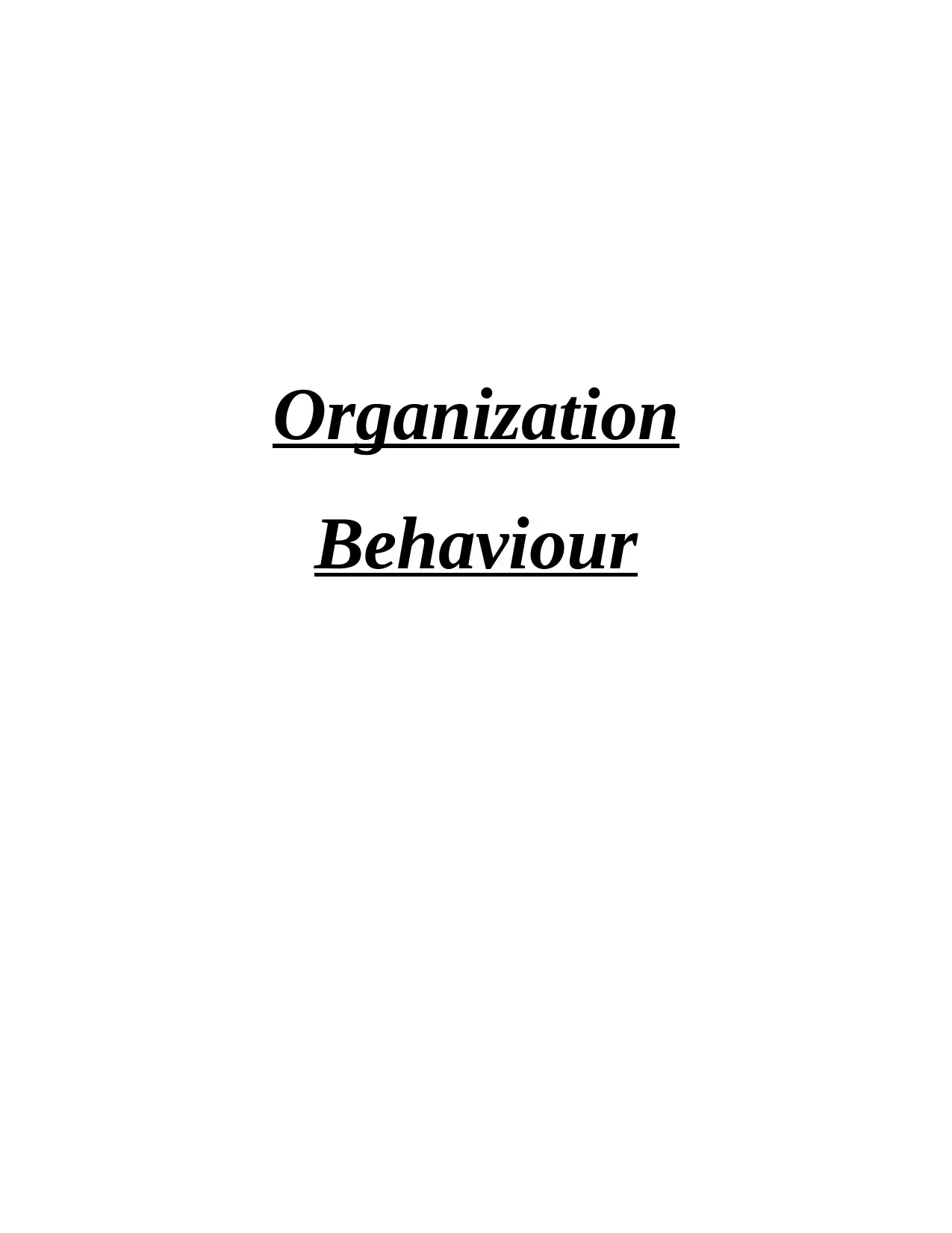
Organization
Behaviour
Behaviour
Paraphrase This Document
Need a fresh take? Get an instant paraphrase of this document with our AI Paraphraser

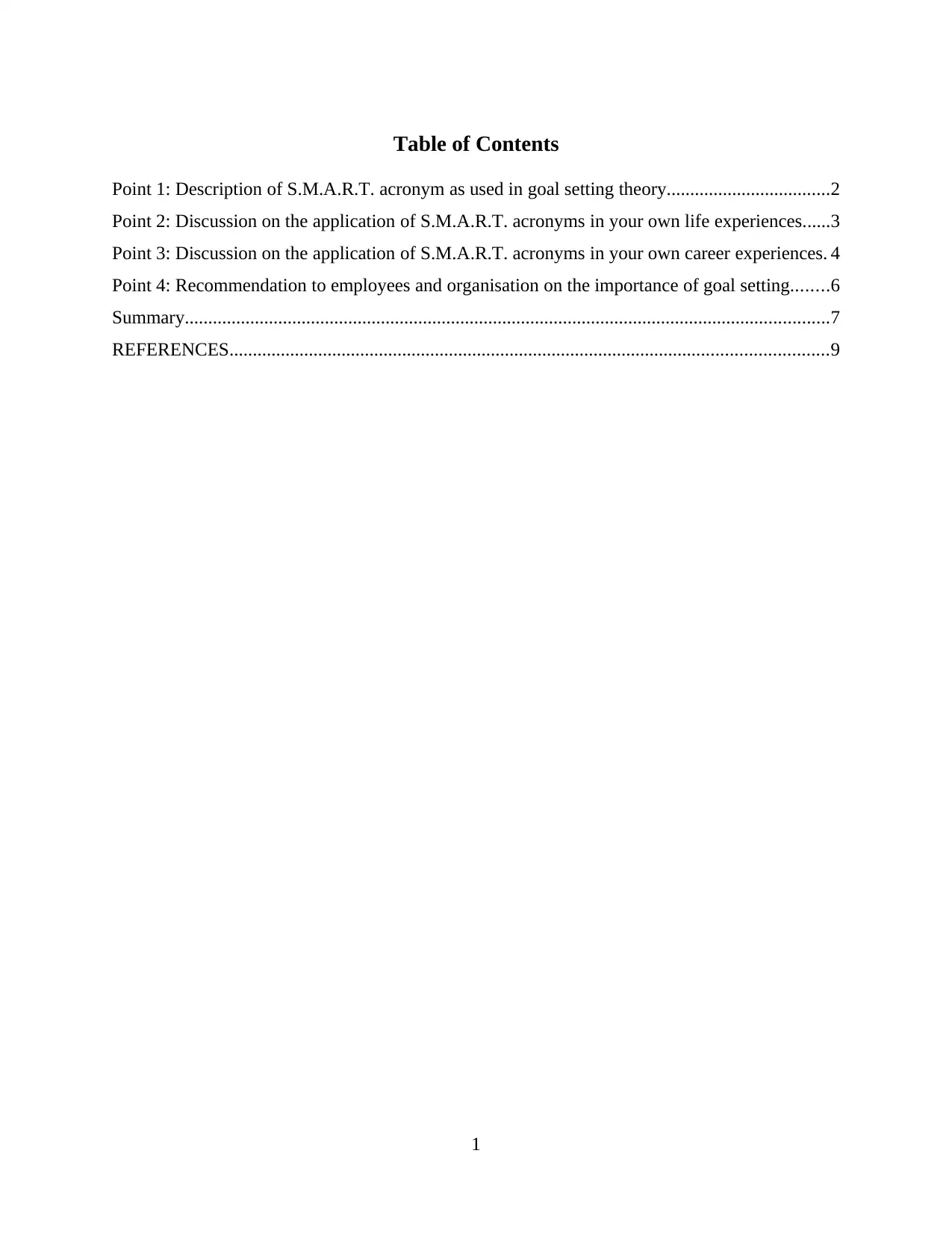
Table of Contents
Point 1: Description of S.M.A.R.T. acronym as used in goal setting theory...................................2
Point 2: Discussion on the application of S.M.A.R.T. acronyms in your own life experiences......3
Point 3: Discussion on the application of S.M.A.R.T. acronyms in your own career experiences. 4
Point 4: Recommendation to employees and organisation on the importance of goal setting........6
Summary..........................................................................................................................................7
REFERENCES................................................................................................................................9
1
Point 1: Description of S.M.A.R.T. acronym as used in goal setting theory...................................2
Point 2: Discussion on the application of S.M.A.R.T. acronyms in your own life experiences......3
Point 3: Discussion on the application of S.M.A.R.T. acronyms in your own career experiences. 4
Point 4: Recommendation to employees and organisation on the importance of goal setting........6
Summary..........................................................................................................................................7
REFERENCES................................................................................................................................9
1
⊘ This is a preview!⊘
Do you want full access?
Subscribe today to unlock all pages.

Trusted by 1+ million students worldwide
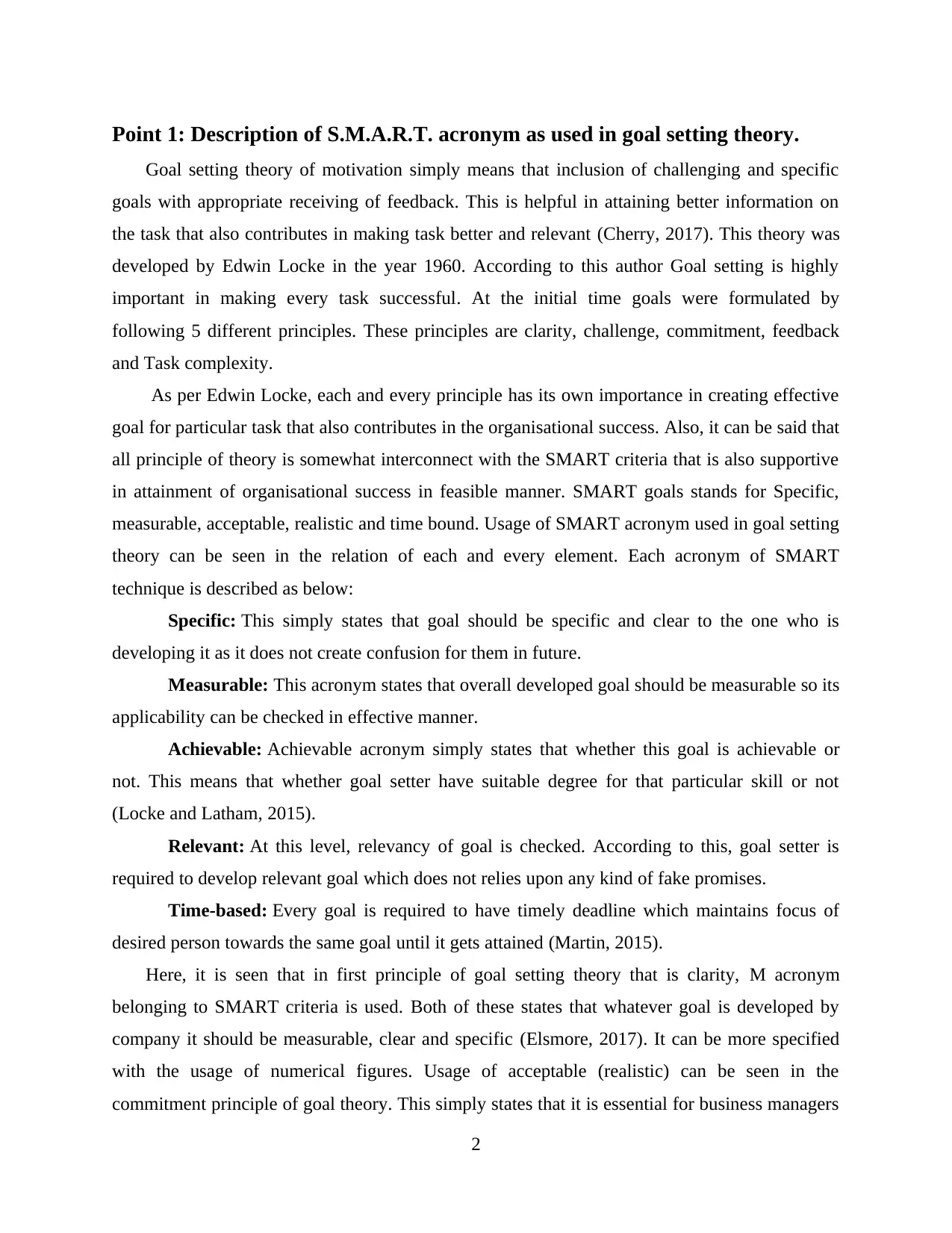
Point 1: Description of S.M.A.R.T. acronym as used in goal setting theory.
Goal setting theory of motivation simply means that inclusion of challenging and specific
goals with appropriate receiving of feedback. This is helpful in attaining better information on
the task that also contributes in making task better and relevant (Cherry, 2017). This theory was
developed by Edwin Locke in the year 1960. According to this author Goal setting is highly
important in making every task successful. At the initial time goals were formulated by
following 5 different principles. These principles are clarity, challenge, commitment, feedback
and Task complexity.
As per Edwin Locke, each and every principle has its own importance in creating effective
goal for particular task that also contributes in the organisational success. Also, it can be said that
all principle of theory is somewhat interconnect with the SMART criteria that is also supportive
in attainment of organisational success in feasible manner. SMART goals stands for Specific,
measurable, acceptable, realistic and time bound. Usage of SMART acronym used in goal setting
theory can be seen in the relation of each and every element. Each acronym of SMART
technique is described as below:
Specific: This simply states that goal should be specific and clear to the one who is
developing it as it does not create confusion for them in future.
Measurable: This acronym states that overall developed goal should be measurable so its
applicability can be checked in effective manner.
Achievable: Achievable acronym simply states that whether this goal is achievable or
not. This means that whether goal setter have suitable degree for that particular skill or not
(Locke and Latham, 2015).
Relevant: At this level, relevancy of goal is checked. According to this, goal setter is
required to develop relevant goal which does not relies upon any kind of fake promises.
Time-based: Every goal is required to have timely deadline which maintains focus of
desired person towards the same goal until it gets attained (Martin, 2015).
Here, it is seen that in first principle of goal setting theory that is clarity, M acronym
belonging to SMART criteria is used. Both of these states that whatever goal is developed by
company it should be measurable, clear and specific (Elsmore, 2017). It can be more specified
with the usage of numerical figures. Usage of acceptable (realistic) can be seen in the
commitment principle of goal theory. This simply states that it is essential for business managers
2
Goal setting theory of motivation simply means that inclusion of challenging and specific
goals with appropriate receiving of feedback. This is helpful in attaining better information on
the task that also contributes in making task better and relevant (Cherry, 2017). This theory was
developed by Edwin Locke in the year 1960. According to this author Goal setting is highly
important in making every task successful. At the initial time goals were formulated by
following 5 different principles. These principles are clarity, challenge, commitment, feedback
and Task complexity.
As per Edwin Locke, each and every principle has its own importance in creating effective
goal for particular task that also contributes in the organisational success. Also, it can be said that
all principle of theory is somewhat interconnect with the SMART criteria that is also supportive
in attainment of organisational success in feasible manner. SMART goals stands for Specific,
measurable, acceptable, realistic and time bound. Usage of SMART acronym used in goal setting
theory can be seen in the relation of each and every element. Each acronym of SMART
technique is described as below:
Specific: This simply states that goal should be specific and clear to the one who is
developing it as it does not create confusion for them in future.
Measurable: This acronym states that overall developed goal should be measurable so its
applicability can be checked in effective manner.
Achievable: Achievable acronym simply states that whether this goal is achievable or
not. This means that whether goal setter have suitable degree for that particular skill or not
(Locke and Latham, 2015).
Relevant: At this level, relevancy of goal is checked. According to this, goal setter is
required to develop relevant goal which does not relies upon any kind of fake promises.
Time-based: Every goal is required to have timely deadline which maintains focus of
desired person towards the same goal until it gets attained (Martin, 2015).
Here, it is seen that in first principle of goal setting theory that is clarity, M acronym
belonging to SMART criteria is used. Both of these states that whatever goal is developed by
company it should be measurable, clear and specific (Elsmore, 2017). It can be more specified
with the usage of numerical figures. Usage of acceptable (realistic) can be seen in the
commitment principle of goal theory. This simply states that it is essential for business managers
2
Paraphrase This Document
Need a fresh take? Get an instant paraphrase of this document with our AI Paraphraser
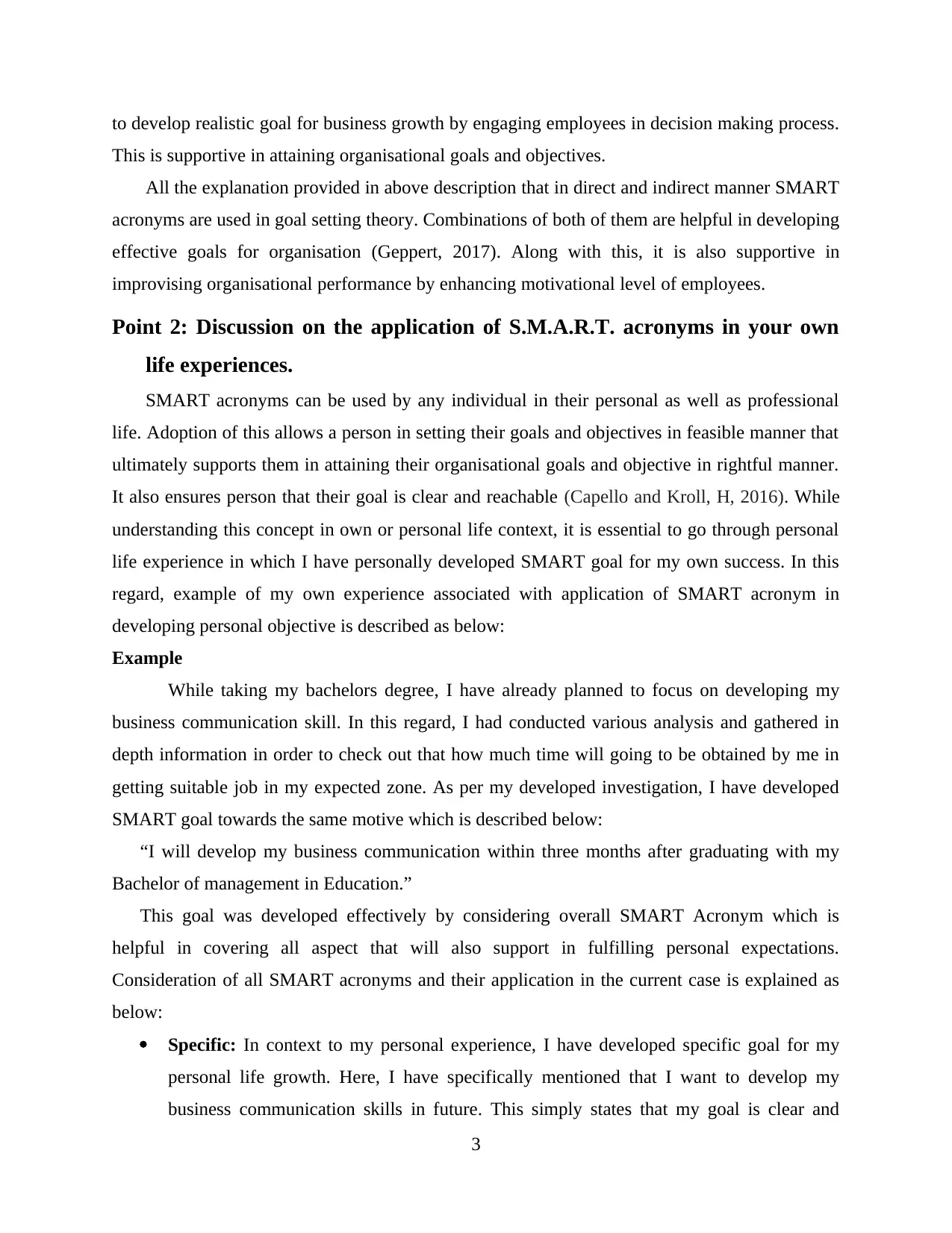
to develop realistic goal for business growth by engaging employees in decision making process.
This is supportive in attaining organisational goals and objectives.
All the explanation provided in above description that in direct and indirect manner SMART
acronyms are used in goal setting theory. Combinations of both of them are helpful in developing
effective goals for organisation (Geppert, 2017). Along with this, it is also supportive in
improvising organisational performance by enhancing motivational level of employees.
Point 2: Discussion on the application of S.M.A.R.T. acronyms in your own
life experiences.
SMART acronyms can be used by any individual in their personal as well as professional
life. Adoption of this allows a person in setting their goals and objectives in feasible manner that
ultimately supports them in attaining their organisational goals and objective in rightful manner.
It also ensures person that their goal is clear and reachable (Capello and Kroll, H, 2016). While
understanding this concept in own or personal life context, it is essential to go through personal
life experience in which I have personally developed SMART goal for my own success. In this
regard, example of my own experience associated with application of SMART acronym in
developing personal objective is described as below:
Example
While taking my bachelors degree, I have already planned to focus on developing my
business communication skill. In this regard, I had conducted various analysis and gathered in
depth information in order to check out that how much time will going to be obtained by me in
getting suitable job in my expected zone. As per my developed investigation, I have developed
SMART goal towards the same motive which is described below:
“I will develop my business communication within three months after graduating with my
Bachelor of management in Education.”
This goal was developed effectively by considering overall SMART Acronym which is
helpful in covering all aspect that will also support in fulfilling personal expectations.
Consideration of all SMART acronyms and their application in the current case is explained as
below:
Specific: In context to my personal experience, I have developed specific goal for my
personal life growth. Here, I have specifically mentioned that I want to develop my
business communication skills in future. This simply states that my goal is clear and
3
This is supportive in attaining organisational goals and objectives.
All the explanation provided in above description that in direct and indirect manner SMART
acronyms are used in goal setting theory. Combinations of both of them are helpful in developing
effective goals for organisation (Geppert, 2017). Along with this, it is also supportive in
improvising organisational performance by enhancing motivational level of employees.
Point 2: Discussion on the application of S.M.A.R.T. acronyms in your own
life experiences.
SMART acronyms can be used by any individual in their personal as well as professional
life. Adoption of this allows a person in setting their goals and objectives in feasible manner that
ultimately supports them in attaining their organisational goals and objective in rightful manner.
It also ensures person that their goal is clear and reachable (Capello and Kroll, H, 2016). While
understanding this concept in own or personal life context, it is essential to go through personal
life experience in which I have personally developed SMART goal for my own success. In this
regard, example of my own experience associated with application of SMART acronym in
developing personal objective is described as below:
Example
While taking my bachelors degree, I have already planned to focus on developing my
business communication skill. In this regard, I had conducted various analysis and gathered in
depth information in order to check out that how much time will going to be obtained by me in
getting suitable job in my expected zone. As per my developed investigation, I have developed
SMART goal towards the same motive which is described below:
“I will develop my business communication within three months after graduating with my
Bachelor of management in Education.”
This goal was developed effectively by considering overall SMART Acronym which is
helpful in covering all aspect that will also support in fulfilling personal expectations.
Consideration of all SMART acronyms and their application in the current case is explained as
below:
Specific: In context to my personal experience, I have developed specific goal for my
personal life growth. Here, I have specifically mentioned that I want to develop my
business communication skills in future. This simply states that my goal is clear and
3
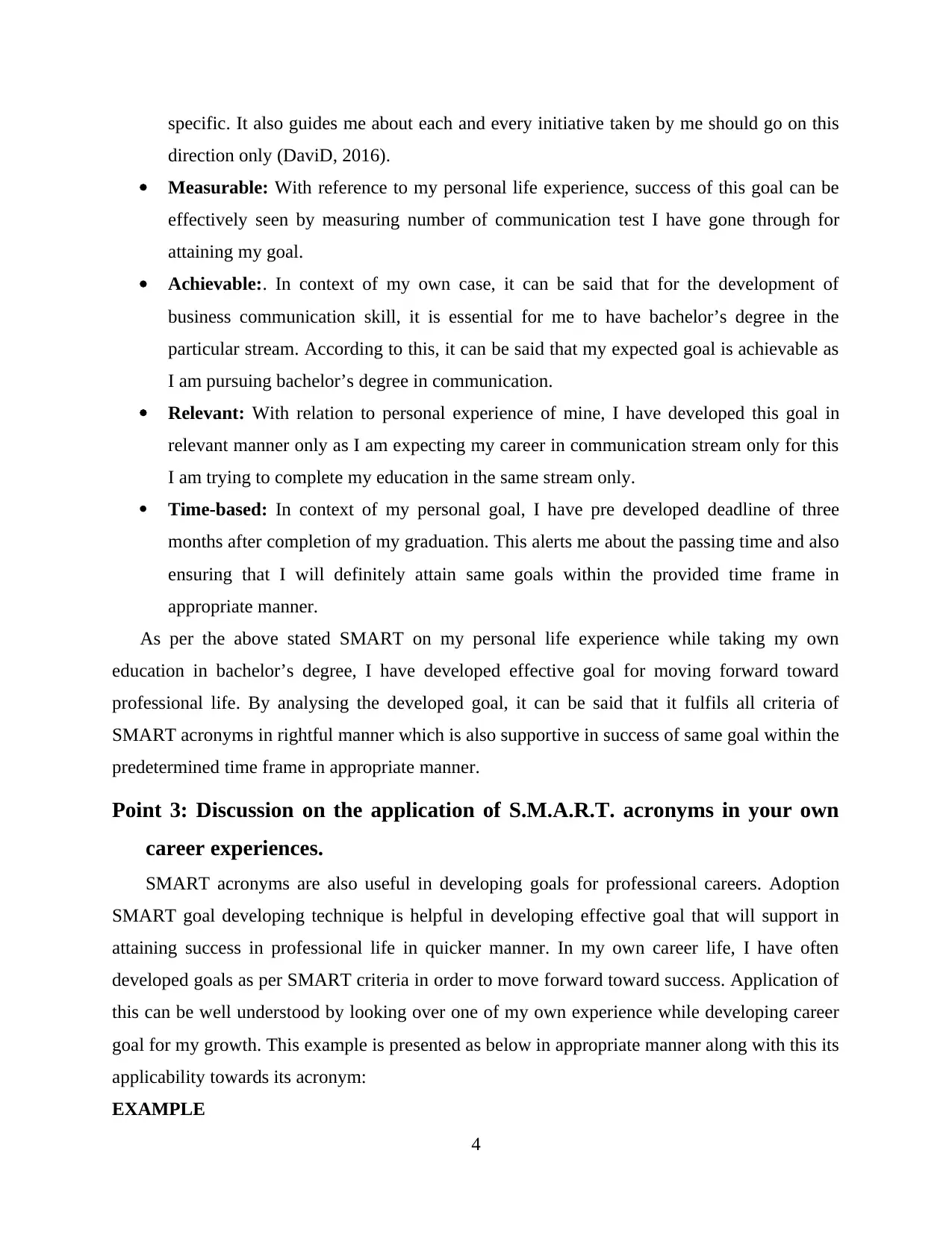
specific. It also guides me about each and every initiative taken by me should go on this
direction only (DaviD, 2016).
Measurable: With reference to my personal life experience, success of this goal can be
effectively seen by measuring number of communication test I have gone through for
attaining my goal.
Achievable:. In context of my own case, it can be said that for the development of
business communication skill, it is essential for me to have bachelor’s degree in the
particular stream. According to this, it can be said that my expected goal is achievable as
I am pursuing bachelor’s degree in communication.
Relevant: With relation to personal experience of mine, I have developed this goal in
relevant manner only as I am expecting my career in communication stream only for this
I am trying to complete my education in the same stream only.
Time-based: In context of my personal goal, I have pre developed deadline of three
months after completion of my graduation. This alerts me about the passing time and also
ensuring that I will definitely attain same goals within the provided time frame in
appropriate manner.
As per the above stated SMART on my personal life experience while taking my own
education in bachelor’s degree, I have developed effective goal for moving forward toward
professional life. By analysing the developed goal, it can be said that it fulfils all criteria of
SMART acronyms in rightful manner which is also supportive in success of same goal within the
predetermined time frame in appropriate manner.
Point 3: Discussion on the application of S.M.A.R.T. acronyms in your own
career experiences.
SMART acronyms are also useful in developing goals for professional careers. Adoption
SMART goal developing technique is helpful in developing effective goal that will support in
attaining success in professional life in quicker manner. In my own career life, I have often
developed goals as per SMART criteria in order to move forward toward success. Application of
this can be well understood by looking over one of my own experience while developing career
goal for my growth. This example is presented as below in appropriate manner along with this its
applicability towards its acronym:
EXAMPLE
4
direction only (DaviD, 2016).
Measurable: With reference to my personal life experience, success of this goal can be
effectively seen by measuring number of communication test I have gone through for
attaining my goal.
Achievable:. In context of my own case, it can be said that for the development of
business communication skill, it is essential for me to have bachelor’s degree in the
particular stream. According to this, it can be said that my expected goal is achievable as
I am pursuing bachelor’s degree in communication.
Relevant: With relation to personal experience of mine, I have developed this goal in
relevant manner only as I am expecting my career in communication stream only for this
I am trying to complete my education in the same stream only.
Time-based: In context of my personal goal, I have pre developed deadline of three
months after completion of my graduation. This alerts me about the passing time and also
ensuring that I will definitely attain same goals within the provided time frame in
appropriate manner.
As per the above stated SMART on my personal life experience while taking my own
education in bachelor’s degree, I have developed effective goal for moving forward toward
professional life. By analysing the developed goal, it can be said that it fulfils all criteria of
SMART acronyms in rightful manner which is also supportive in success of same goal within the
predetermined time frame in appropriate manner.
Point 3: Discussion on the application of S.M.A.R.T. acronyms in your own
career experiences.
SMART acronyms are also useful in developing goals for professional careers. Adoption
SMART goal developing technique is helpful in developing effective goal that will support in
attaining success in professional life in quicker manner. In my own career life, I have often
developed goals as per SMART criteria in order to move forward toward success. Application of
this can be well understood by looking over one of my own experience while developing career
goal for my growth. This example is presented as below in appropriate manner along with this its
applicability towards its acronym:
EXAMPLE
4
⊘ This is a preview!⊘
Do you want full access?
Subscribe today to unlock all pages.

Trusted by 1+ million students worldwide
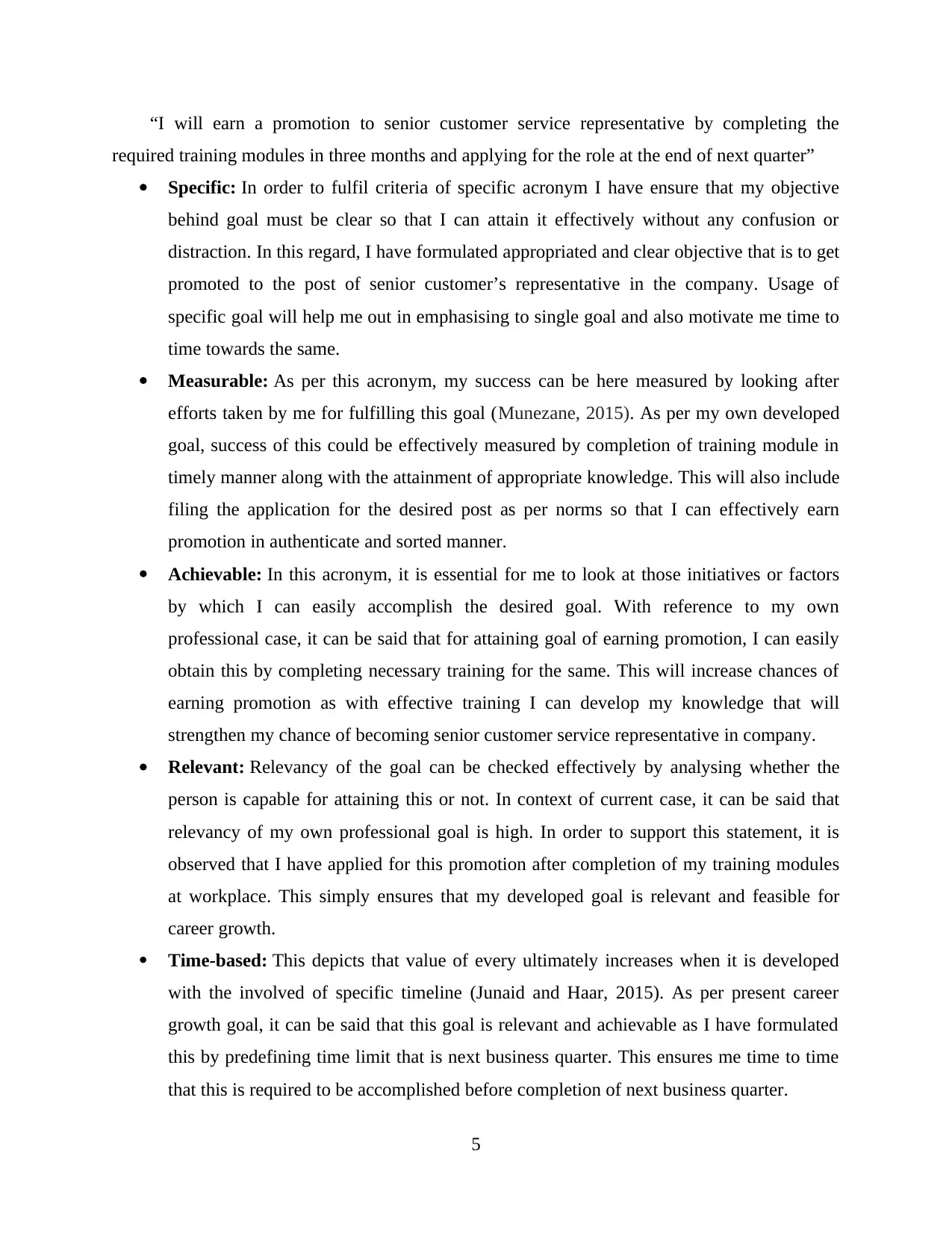
“I will earn a promotion to senior customer service representative by completing the
required training modules in three months and applying for the role at the end of next quarter”
Specific: In order to fulfil criteria of specific acronym I have ensure that my objective
behind goal must be clear so that I can attain it effectively without any confusion or
distraction. In this regard, I have formulated appropriated and clear objective that is to get
promoted to the post of senior customer’s representative in the company. Usage of
specific goal will help me out in emphasising to single goal and also motivate me time to
time towards the same.
Measurable: As per this acronym, my success can be here measured by looking after
efforts taken by me for fulfilling this goal (Munezane, 2015). As per my own developed
goal, success of this could be effectively measured by completion of training module in
timely manner along with the attainment of appropriate knowledge. This will also include
filing the application for the desired post as per norms so that I can effectively earn
promotion in authenticate and sorted manner.
Achievable: In this acronym, it is essential for me to look at those initiatives or factors
by which I can easily accomplish the desired goal. With reference to my own
professional case, it can be said that for attaining goal of earning promotion, I can easily
obtain this by completing necessary training for the same. This will increase chances of
earning promotion as with effective training I can develop my knowledge that will
strengthen my chance of becoming senior customer service representative in company.
Relevant: Relevancy of the goal can be checked effectively by analysing whether the
person is capable for attaining this or not. In context of current case, it can be said that
relevancy of my own professional goal is high. In order to support this statement, it is
observed that I have applied for this promotion after completion of my training modules
at workplace. This simply ensures that my developed goal is relevant and feasible for
career growth.
Time-based: This depicts that value of every ultimately increases when it is developed
with the involved of specific timeline (Junaid and Haar, 2015). As per present career
growth goal, it can be said that this goal is relevant and achievable as I have formulated
this by predefining time limit that is next business quarter. This ensures me time to time
that this is required to be accomplished before completion of next business quarter.
5
required training modules in three months and applying for the role at the end of next quarter”
Specific: In order to fulfil criteria of specific acronym I have ensure that my objective
behind goal must be clear so that I can attain it effectively without any confusion or
distraction. In this regard, I have formulated appropriated and clear objective that is to get
promoted to the post of senior customer’s representative in the company. Usage of
specific goal will help me out in emphasising to single goal and also motivate me time to
time towards the same.
Measurable: As per this acronym, my success can be here measured by looking after
efforts taken by me for fulfilling this goal (Munezane, 2015). As per my own developed
goal, success of this could be effectively measured by completion of training module in
timely manner along with the attainment of appropriate knowledge. This will also include
filing the application for the desired post as per norms so that I can effectively earn
promotion in authenticate and sorted manner.
Achievable: In this acronym, it is essential for me to look at those initiatives or factors
by which I can easily accomplish the desired goal. With reference to my own
professional case, it can be said that for attaining goal of earning promotion, I can easily
obtain this by completing necessary training for the same. This will increase chances of
earning promotion as with effective training I can develop my knowledge that will
strengthen my chance of becoming senior customer service representative in company.
Relevant: Relevancy of the goal can be checked effectively by analysing whether the
person is capable for attaining this or not. In context of current case, it can be said that
relevancy of my own professional goal is high. In order to support this statement, it is
observed that I have applied for this promotion after completion of my training modules
at workplace. This simply ensures that my developed goal is relevant and feasible for
career growth.
Time-based: This depicts that value of every ultimately increases when it is developed
with the involved of specific timeline (Junaid and Haar, 2015). As per present career
growth goal, it can be said that this goal is relevant and achievable as I have formulated
this by predefining time limit that is next business quarter. This ensures me time to time
that this is required to be accomplished before completion of next business quarter.
5
Paraphrase This Document
Need a fresh take? Get an instant paraphrase of this document with our AI Paraphraser
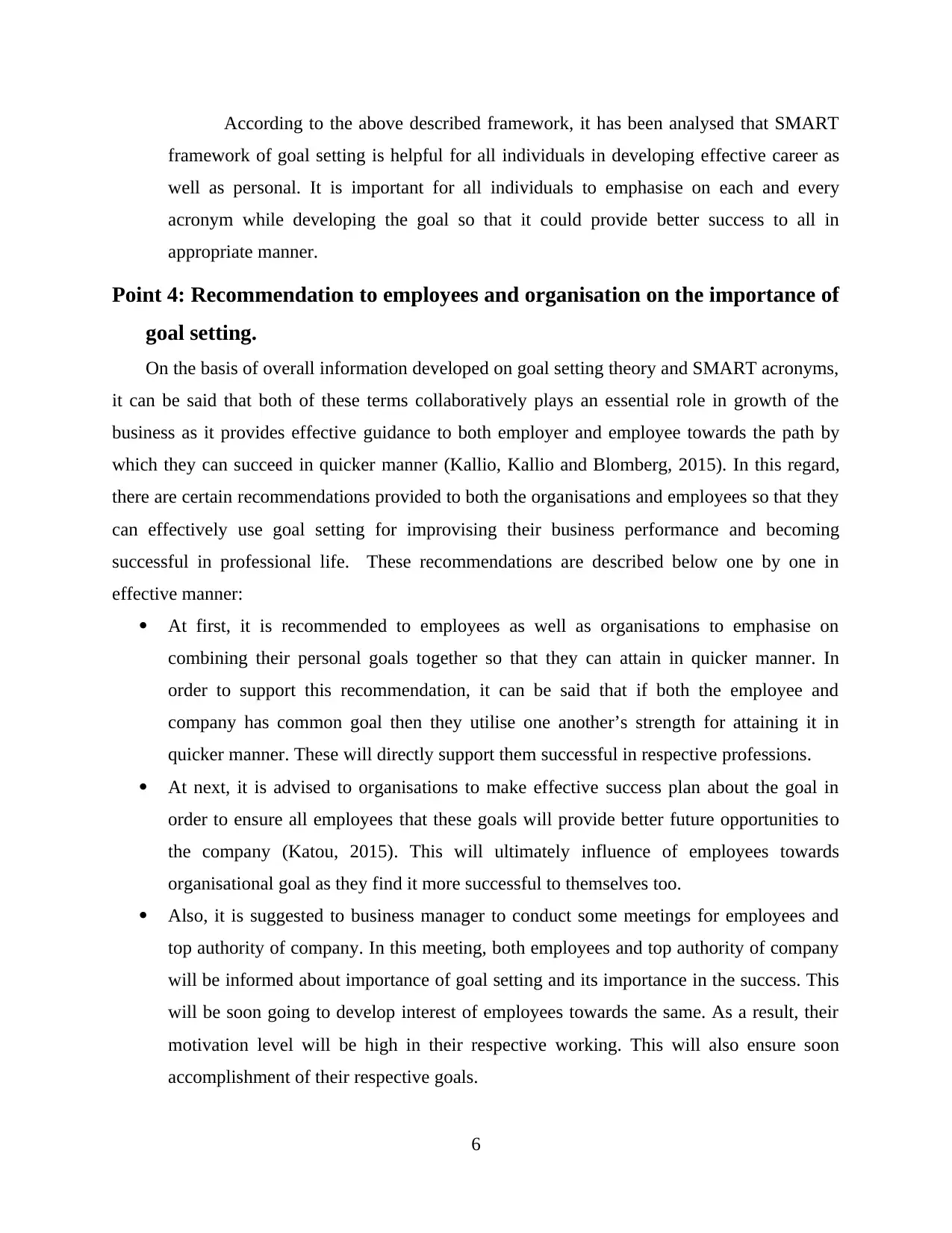
According to the above described framework, it has been analysed that SMART
framework of goal setting is helpful for all individuals in developing effective career as
well as personal. It is important for all individuals to emphasise on each and every
acronym while developing the goal so that it could provide better success to all in
appropriate manner.
Point 4: Recommendation to employees and organisation on the importance of
goal setting.
On the basis of overall information developed on goal setting theory and SMART acronyms,
it can be said that both of these terms collaboratively plays an essential role in growth of the
business as it provides effective guidance to both employer and employee towards the path by
which they can succeed in quicker manner (Kallio, Kallio and Blomberg, 2015). In this regard,
there are certain recommendations provided to both the organisations and employees so that they
can effectively use goal setting for improvising their business performance and becoming
successful in professional life. These recommendations are described below one by one in
effective manner:
At first, it is recommended to employees as well as organisations to emphasise on
combining their personal goals together so that they can attain in quicker manner. In
order to support this recommendation, it can be said that if both the employee and
company has common goal then they utilise one another’s strength for attaining it in
quicker manner. These will directly support them successful in respective professions.
At next, it is advised to organisations to make effective success plan about the goal in
order to ensure all employees that these goals will provide better future opportunities to
the company (Katou, 2015). This will ultimately influence of employees towards
organisational goal as they find it more successful to themselves too.
Also, it is suggested to business manager to conduct some meetings for employees and
top authority of company. In this meeting, both employees and top authority of company
will be informed about importance of goal setting and its importance in the success. This
will be soon going to develop interest of employees towards the same. As a result, their
motivation level will be high in their respective working. This will also ensure soon
accomplishment of their respective goals.
6
framework of goal setting is helpful for all individuals in developing effective career as
well as personal. It is important for all individuals to emphasise on each and every
acronym while developing the goal so that it could provide better success to all in
appropriate manner.
Point 4: Recommendation to employees and organisation on the importance of
goal setting.
On the basis of overall information developed on goal setting theory and SMART acronyms,
it can be said that both of these terms collaboratively plays an essential role in growth of the
business as it provides effective guidance to both employer and employee towards the path by
which they can succeed in quicker manner (Kallio, Kallio and Blomberg, 2015). In this regard,
there are certain recommendations provided to both the organisations and employees so that they
can effectively use goal setting for improvising their business performance and becoming
successful in professional life. These recommendations are described below one by one in
effective manner:
At first, it is recommended to employees as well as organisations to emphasise on
combining their personal goals together so that they can attain in quicker manner. In
order to support this recommendation, it can be said that if both the employee and
company has common goal then they utilise one another’s strength for attaining it in
quicker manner. These will directly support them successful in respective professions.
At next, it is advised to organisations to make effective success plan about the goal in
order to ensure all employees that these goals will provide better future opportunities to
the company (Katou, 2015). This will ultimately influence of employees towards
organisational goal as they find it more successful to themselves too.
Also, it is suggested to business manager to conduct some meetings for employees and
top authority of company. In this meeting, both employees and top authority of company
will be informed about importance of goal setting and its importance in the success. This
will be soon going to develop interest of employees towards the same. As a result, their
motivation level will be high in their respective working. This will also ensure soon
accomplishment of their respective goals.
6
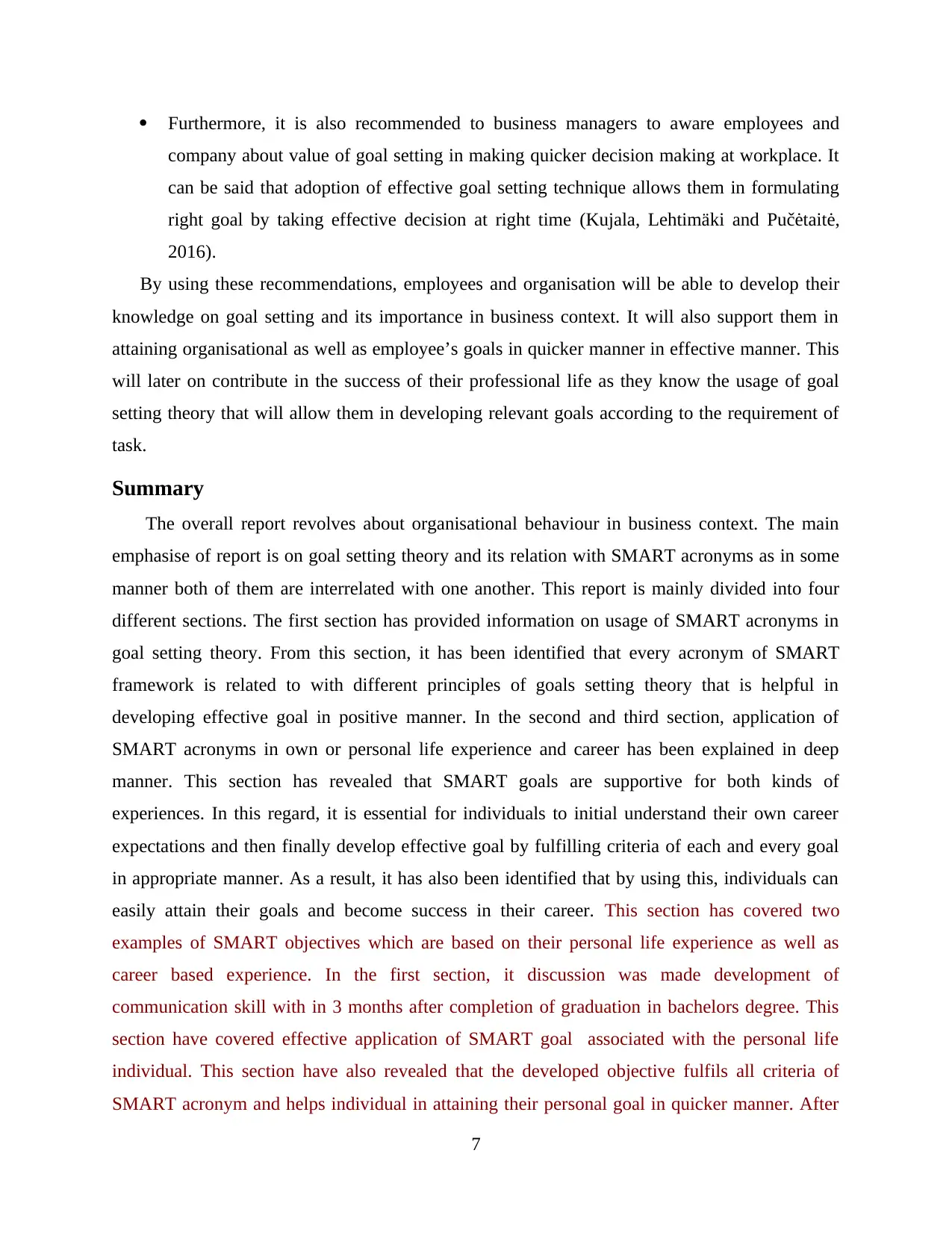
Furthermore, it is also recommended to business managers to aware employees and
company about value of goal setting in making quicker decision making at workplace. It
can be said that adoption of effective goal setting technique allows them in formulating
right goal by taking effective decision at right time (Kujala, Lehtimäki and Pučėtaitė,
2016).
By using these recommendations, employees and organisation will be able to develop their
knowledge on goal setting and its importance in business context. It will also support them in
attaining organisational as well as employee’s goals in quicker manner in effective manner. This
will later on contribute in the success of their professional life as they know the usage of goal
setting theory that will allow them in developing relevant goals according to the requirement of
task.
Summary
The overall report revolves about organisational behaviour in business context. The main
emphasise of report is on goal setting theory and its relation with SMART acronyms as in some
manner both of them are interrelated with one another. This report is mainly divided into four
different sections. The first section has provided information on usage of SMART acronyms in
goal setting theory. From this section, it has been identified that every acronym of SMART
framework is related to with different principles of goals setting theory that is helpful in
developing effective goal in positive manner. In the second and third section, application of
SMART acronyms in own or personal life experience and career has been explained in deep
manner. This section has revealed that SMART goals are supportive for both kinds of
experiences. In this regard, it is essential for individuals to initial understand their own career
expectations and then finally develop effective goal by fulfilling criteria of each and every goal
in appropriate manner. As a result, it has also been identified that by using this, individuals can
easily attain their goals and become success in their career. This section has covered two
examples of SMART objectives which are based on their personal life experience as well as
career based experience. In the first section, it discussion was made development of
communication skill with in 3 months after completion of graduation in bachelors degree. This
section have covered effective application of SMART goal associated with the personal life
individual. This section have also revealed that the developed objective fulfils all criteria of
SMART acronym and helps individual in attaining their personal goal in quicker manner. After
7
company about value of goal setting in making quicker decision making at workplace. It
can be said that adoption of effective goal setting technique allows them in formulating
right goal by taking effective decision at right time (Kujala, Lehtimäki and Pučėtaitė,
2016).
By using these recommendations, employees and organisation will be able to develop their
knowledge on goal setting and its importance in business context. It will also support them in
attaining organisational as well as employee’s goals in quicker manner in effective manner. This
will later on contribute in the success of their professional life as they know the usage of goal
setting theory that will allow them in developing relevant goals according to the requirement of
task.
Summary
The overall report revolves about organisational behaviour in business context. The main
emphasise of report is on goal setting theory and its relation with SMART acronyms as in some
manner both of them are interrelated with one another. This report is mainly divided into four
different sections. The first section has provided information on usage of SMART acronyms in
goal setting theory. From this section, it has been identified that every acronym of SMART
framework is related to with different principles of goals setting theory that is helpful in
developing effective goal in positive manner. In the second and third section, application of
SMART acronyms in own or personal life experience and career has been explained in deep
manner. This section has revealed that SMART goals are supportive for both kinds of
experiences. In this regard, it is essential for individuals to initial understand their own career
expectations and then finally develop effective goal by fulfilling criteria of each and every goal
in appropriate manner. As a result, it has also been identified that by using this, individuals can
easily attain their goals and become success in their career. This section has covered two
examples of SMART objectives which are based on their personal life experience as well as
career based experience. In the first section, it discussion was made development of
communication skill with in 3 months after completion of graduation in bachelors degree. This
section have covered effective application of SMART goal associated with the personal life
individual. This section have also revealed that the developed objective fulfils all criteria of
SMART acronym and helps individual in attaining their personal goal in quicker manner. After
7
⊘ This is a preview!⊘
Do you want full access?
Subscribe today to unlock all pages.

Trusted by 1+ million students worldwide

fulfilment of this objective learner can easily grow quicker as it is helpful for them in attaining
personal objective. Apart from this, this section has later explained example of SMART
objective associated with the career of individual. Similarly, like previous example application of
SMART acronym has been provided in this section that is completed oriented to professional life
of individual. Application of SMART acronym has helped in identifying that whether the
developed objective will support learner in attaining their personal and professional objective or
not.
The last section of this report has explored various recommendations that could be used by
business managers for enhancing knowledge of employees and company about goal setting and
its importance in business success. From this section, it has been analysed that meeting sessions
is the best recommendation by which employees of the company can easily develop their
knowledge on benefits of goal setting in professional life. Also, they can also improve their
performance by implementing in their career.
8
personal objective. Apart from this, this section has later explained example of SMART
objective associated with the career of individual. Similarly, like previous example application of
SMART acronym has been provided in this section that is completed oriented to professional life
of individual. Application of SMART acronym has helped in identifying that whether the
developed objective will support learner in attaining their personal and professional objective or
not.
The last section of this report has explored various recommendations that could be used by
business managers for enhancing knowledge of employees and company about goal setting and
its importance in business success. From this section, it has been analysed that meeting sessions
is the best recommendation by which employees of the company can easily develop their
knowledge on benefits of goal setting in professional life. Also, they can also improve their
performance by implementing in their career.
8
Paraphrase This Document
Need a fresh take? Get an instant paraphrase of this document with our AI Paraphraser
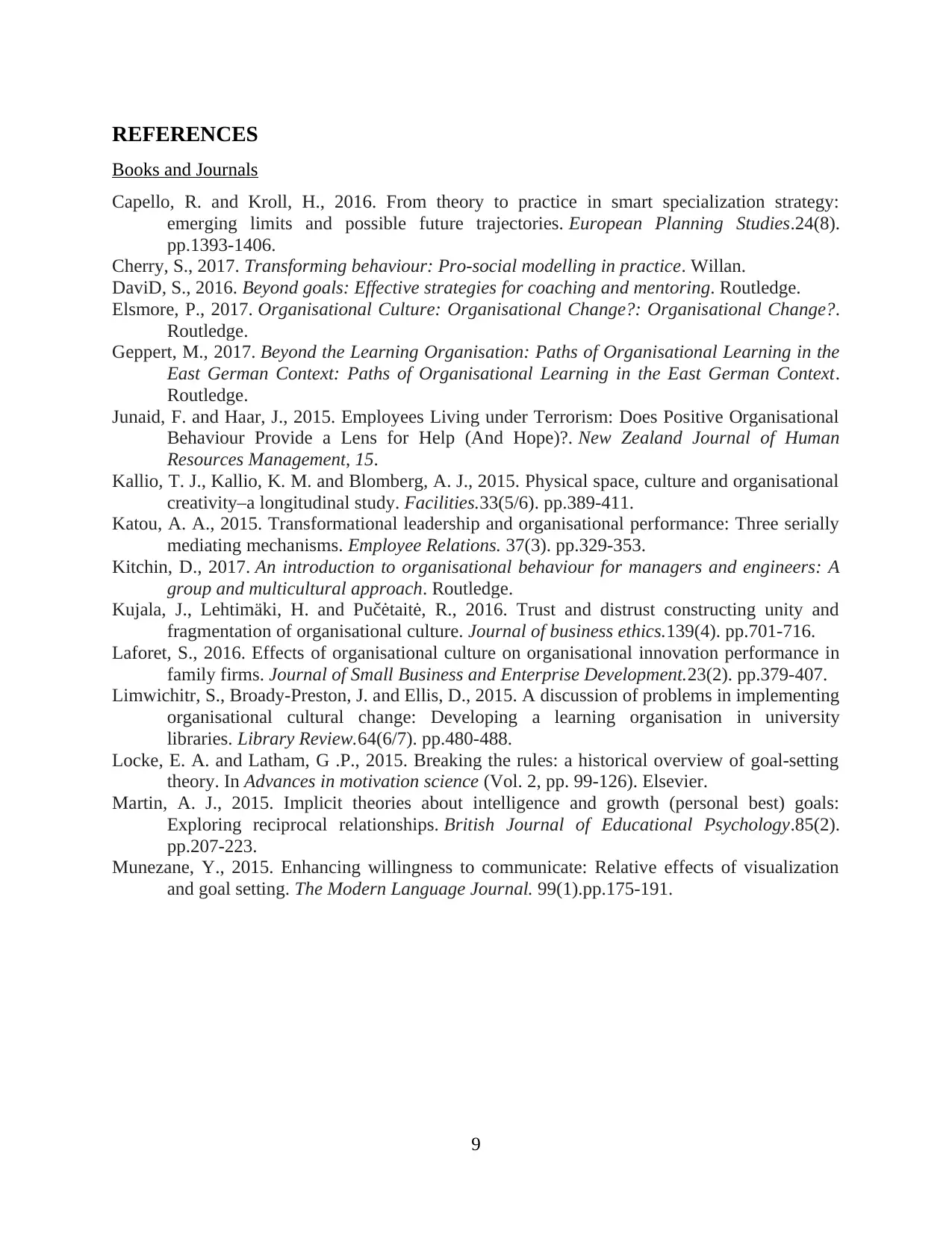
REFERENCES
Books and Journals
Capello, R. and Kroll, H., 2016. From theory to practice in smart specialization strategy:
emerging limits and possible future trajectories. European Planning Studies.24(8).
pp.1393-1406.
Cherry, S., 2017. Transforming behaviour: Pro-social modelling in practice. Willan.
DaviD, S., 2016. Beyond goals: Effective strategies for coaching and mentoring. Routledge.
Elsmore, P., 2017. Organisational Culture: Organisational Change?: Organisational Change?.
Routledge.
Geppert, M., 2017. Beyond the Learning Organisation: Paths of Organisational Learning in the
East German Context: Paths of Organisational Learning in the East German Context.
Routledge.
Junaid, F. and Haar, J., 2015. Employees Living under Terrorism: Does Positive Organisational
Behaviour Provide a Lens for Help (And Hope)?. New Zealand Journal of Human
Resources Management, 15.
Kallio, T. J., Kallio, K. M. and Blomberg, A. J., 2015. Physical space, culture and organisational
creativity–a longitudinal study. Facilities.33(5/6). pp.389-411.
Katou, A. A., 2015. Transformational leadership and organisational performance: Three serially
mediating mechanisms. Employee Relations. 37(3). pp.329-353.
Kitchin, D., 2017. An introduction to organisational behaviour for managers and engineers: A
group and multicultural approach. Routledge.
Kujala, J., Lehtimäki, H. and Pučėtaitė, R., 2016. Trust and distrust constructing unity and
fragmentation of organisational culture. Journal of business ethics.139(4). pp.701-716.
Laforet, S., 2016. Effects of organisational culture on organisational innovation performance in
family firms. Journal of Small Business and Enterprise Development.23(2). pp.379-407.
Limwichitr, S., Broady-Preston, J. and Ellis, D., 2015. A discussion of problems in implementing
organisational cultural change: Developing a learning organisation in university
libraries. Library Review.64(6/7). pp.480-488.
Locke, E. A. and Latham, G .P., 2015. Breaking the rules: a historical overview of goal-setting
theory. In Advances in motivation science (Vol. 2, pp. 99-126). Elsevier.
Martin, A. J., 2015. Implicit theories about intelligence and growth (personal best) goals:
Exploring reciprocal relationships. British Journal of Educational Psychology.85(2).
pp.207-223.
Munezane, Y., 2015. Enhancing willingness to communicate: Relative effects of visualization
and goal setting. The Modern Language Journal. 99(1).pp.175-191.
9
Books and Journals
Capello, R. and Kroll, H., 2016. From theory to practice in smart specialization strategy:
emerging limits and possible future trajectories. European Planning Studies.24(8).
pp.1393-1406.
Cherry, S., 2017. Transforming behaviour: Pro-social modelling in practice. Willan.
DaviD, S., 2016. Beyond goals: Effective strategies for coaching and mentoring. Routledge.
Elsmore, P., 2017. Organisational Culture: Organisational Change?: Organisational Change?.
Routledge.
Geppert, M., 2017. Beyond the Learning Organisation: Paths of Organisational Learning in the
East German Context: Paths of Organisational Learning in the East German Context.
Routledge.
Junaid, F. and Haar, J., 2015. Employees Living under Terrorism: Does Positive Organisational
Behaviour Provide a Lens for Help (And Hope)?. New Zealand Journal of Human
Resources Management, 15.
Kallio, T. J., Kallio, K. M. and Blomberg, A. J., 2015. Physical space, culture and organisational
creativity–a longitudinal study. Facilities.33(5/6). pp.389-411.
Katou, A. A., 2015. Transformational leadership and organisational performance: Three serially
mediating mechanisms. Employee Relations. 37(3). pp.329-353.
Kitchin, D., 2017. An introduction to organisational behaviour for managers and engineers: A
group and multicultural approach. Routledge.
Kujala, J., Lehtimäki, H. and Pučėtaitė, R., 2016. Trust and distrust constructing unity and
fragmentation of organisational culture. Journal of business ethics.139(4). pp.701-716.
Laforet, S., 2016. Effects of organisational culture on organisational innovation performance in
family firms. Journal of Small Business and Enterprise Development.23(2). pp.379-407.
Limwichitr, S., Broady-Preston, J. and Ellis, D., 2015. A discussion of problems in implementing
organisational cultural change: Developing a learning organisation in university
libraries. Library Review.64(6/7). pp.480-488.
Locke, E. A. and Latham, G .P., 2015. Breaking the rules: a historical overview of goal-setting
theory. In Advances in motivation science (Vol. 2, pp. 99-126). Elsevier.
Martin, A. J., 2015. Implicit theories about intelligence and growth (personal best) goals:
Exploring reciprocal relationships. British Journal of Educational Psychology.85(2).
pp.207-223.
Munezane, Y., 2015. Enhancing willingness to communicate: Relative effects of visualization
and goal setting. The Modern Language Journal. 99(1).pp.175-191.
9
1 out of 11
Related Documents
Your All-in-One AI-Powered Toolkit for Academic Success.
+13062052269
info@desklib.com
Available 24*7 on WhatsApp / Email
![[object Object]](/_next/static/media/star-bottom.7253800d.svg)
Unlock your academic potential
Copyright © 2020–2026 A2Z Services. All Rights Reserved. Developed and managed by ZUCOL.





